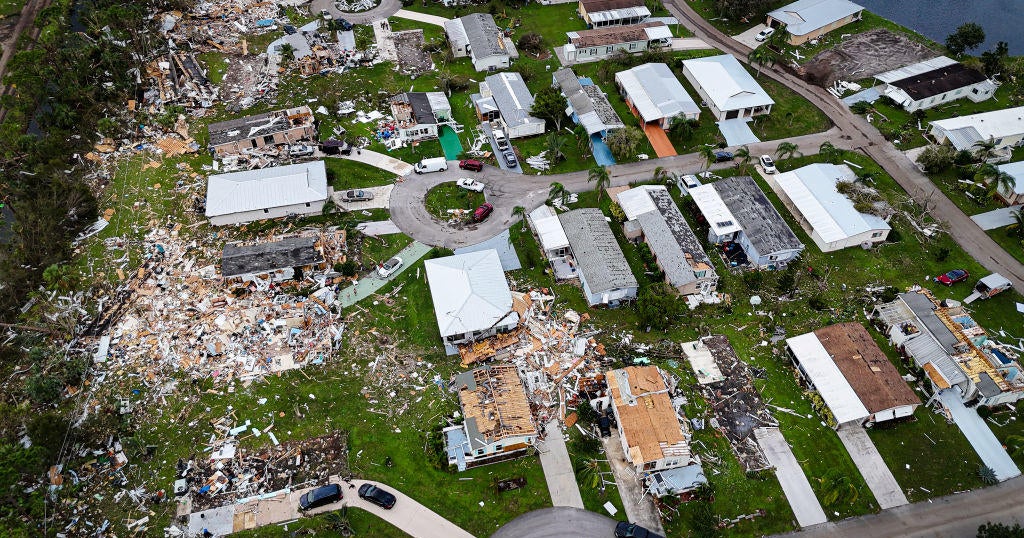CBS News
Amazon and Google have plans for fueling their data centers: nuclear power

Amazon on Wednesday said it has a plan to feed its growing need for power: investing in small nuclear reactors. The announcement comes just two days after Google said it’s pursuing a similar path by purchasing nuclear energy from Kairos Power.
The tech giants are seeking new sources of carbon-free electricity to meet surging demand from data centers and artificial intelligence, with their plans coming after Microsoft said last month that it will buy energy from the Three Mile Island nuclear power plant.
All three companies have been investing in solar and wind technologies, which make electricity without producing greenhouse gas emissions. Now they say they need to go further in the search for clean electricity to meet both demand and their own commitments to cut emissions.
The tech partnerships to buy nuclear power could be a “marriage made in heaven,” noted Tim Winter, a portfolio manager at Gabelli Funds, in an email to CBS MoneyWatch. “Big Tech wants power to fuel huge new AI data centers” because a lack of U.S. power supply could slow down technological developments.
Nuclear energy is a climate solution in that its reactors don’t emit the planet-warming greenhouse gases that come from power plants that burn fossil fuels, such as oil, coal and gas. The demand for power is surging globally as buildings and vehicles electrify, and with the rise of AI.
People used more electricity than ever last year, placing strain on electric grids around the world. Much of the demand comes from data centers and artificial intelligence.
The International Energy Agency forecasts that data centers’ total electricity consumption could reach more than 1,000 terawatt hours in 2026, more than doubling from 2022. Estimates suggest one terawatt hour can power 70,000 homes for a year.
“AI is driving a significant increase in the amount of data centers and power that are required on the grid,” Kevin Miller, Amazon Web Services’ vice president of global data centers, told The Associated Press, adding: “We view advanced new nuclear capacity as really key and essential.”
Modular reactors
The United States is pursuing small modular reactors, a type of nuclear reactor that can generate up to roughly one-third the amount of power of a traditional reactor. Developers say small reactors will be built faster and at a lower cost than large power reactors, scaling to fit needs of a particular location.
Developers aim to start spinning up electricity in the early 2030s, if the Nuclear Regulatory Commission gives permission to build and operate their designs and the technology succeeds.
If new clean power isn’t added as data centers are developed, the U.S. runs the risk of “browning the grid,” or including more power that isn’t made from clean sources, said Kathryn Huff, a former U.S. assistant secretary for nuclear energy who is now an associate professor at the University of Illinois Urbana-Champaign.
The reactors are currently under development, with none currently providing power to the electric grid in the U.S. Big investors can help change that, and these announcements could be the “inflection point” that makes scaling up this technology truly possible, Huff said.
Jacopo Buongiorno, professor of nuclear science and engineering at the Massachusetts Institute of Technology, echoed that, saying the industry needs customers who value the reliability and carbon-free attributes of nuclear energy enough to pay a premium for it at first, until a number of the next-generation reactors are deployed and the cost comes down.
Google’s deal with Kairos Power
On Monday, Google said it was signing a contract to purchase nuclear energy from multiple small modular reactors that Kairos Power, a nuclear technology company, plans to develop.
The news highlights “the technologies that we’re going to need to achieve round-the-clock clean energy, not only for Google but for the world,” Michael Terrell, Google’s senior director of energy and climate, told the AP.
With Kairos, Google said it expects to bring the first small modular reactor online by 2030, with more to come through 2035. The deal is projected to bring 500 megawatts of power to the grid. For context, Google consumed more than 24 terawatt hours of electricity last year, according to the company’s annual environmental report. One terawatt is equal to 1,000,000 megawatts.
Meanwhile, Amazon’s announcements Wednesday included working with utility company Dominion Energy to explore putting a small modular reactor near its existing North Anna nuclear power station in Virginia. The e-commerce giant is investing in reactor developer X-energy for its early development work, and collaborating with regional utility Energy Northwest in central Washington to put four of the X-energy reactors there.
Combined, the three announcements could account for more than 5,000 megawatts of power by the late 2030s with the possibility of more. All of that is still likely only a small fraction of the company’s total energy consumption, a figure that Amazon does not report publicly.
Small nuclear footprint
New reactor designs pair well with industrial applications because they can be built on a small footprint and generate reliable power, with some able to provide high-temperature heat, too, at the site, said Doug True, chief nuclear officer at the industry trade association, Nuclear Energy Institute.
“It seems like a really good fit to support those facilities, and for a lot of different applications depending upon the amount of power that’s needed by the customer,” he said.
Both Amazon and Google have committed to using renewable energy to address climate change. By 2030, Google has pledged to meet net-zero emissions, and run carbon-free energy every hour of every day on every grid where it operates. The tech behemoth says it has already matched 100% of its global electricity consumption with renewable energy purchases on an annual basis. However, the company has fallen short on decreasing its emissions.
Amazon has said it would match all of its global electricity consumption with 100% renewable energy by 2030, and recently announced it met that goal early in 2023. Though the company has matched its consumption as far as offset purchases of an equivalent amount of renewable energy, that does not necessarily mean it is using the renewable energy to power its operations.
Amazon saw its electricity emissions drop 11% from 2022 to 2023, but its direct emissions, which includes fuel used to transport and deliver packages, increased 7%, according to its 2023 sustainability report. The company is also targeting net zero-carbon by 2040.
CBS News
Biden, Obama, Clinton honor Ethel Kennedy

Watch CBS News
Be the first to know
Get browser notifications for breaking news, live events, and exclusive reporting.
CBS News
New wave of calls for Congress to vote on disaster aid before election

There is a new wave of calls for Congress to return to Washington to respond to the growing costs of Hurricanes Helene and Milton. Multiple members of Congress from hurricane-ravaged states have issued new calls for the U.S. House and Senate to respond to the depletion of funds from the U.S. Small Business Administration disaster loan fund.
“It’s unacceptable that Congress remains in recess while families and businesses across North Carolina and beyond are in urgent need of assistance,” said Rep. Wally Nickel, a first-term Democrat from North Carolina.
Nickel said, “In the aftermath of Hurricane Helene, our communities are struggling to recover and our small businesses are desperate for support as they work to rebuild. Their recovery efforts are stalled without additional funding.”
Congress has returned home through the middle of November, as the entire U.S. House and nearly a third of the Senate face reelection races. Congressional leaders have defied calls for action on the loan funds before the election.
The U.S. Small Business Administration announced Tuesday that it had exhausted the available funds in its disaster loan program, which is used by businesses and homeowners who are affected by natural disasters. According to CBS News reporting earlier this month, the agency had issued warnings to legislators that the hurricanes risked draining needed funds and urged Congress to swiftly approve more money.
The agency said, “Until Congress appropriates additional funds, the SBA is pausing new loan offers for its direct, low-interest, long-term loans to disaster survivors.” The agency said it will continue to urge victims to apply for loans “given assurances from Congressional leaders that additional funding will be provided upon Congress’s return in November.”
Sen. Rick Scott, a Florida Republican, said he has urged Senate leaders to reconvene as soon as possible after assessments of damage and the needs of agencies, including the Small Business Administration. In a statement posted on social media, Scott said he has spoken with the Small Business Administration to discuss the needs of his constituents.
Rep. Jared Moskowitz, a Florida Democrat and former state emergency manager, told CBS News, “Thousands of applications are coming in each day for disaster loans following Hurricane Helene and Milton. Congress knew this fund was running low as we left for recess during hurricane season, and we failed to be proactive. We shouldn’t be waiting until mid-November to come back to D.C. and fix this.”
Speaker Mike Johnson’s office did not immediately return a request for comment about Congress returning early to address Small Business Administration funding. On “Face the Nation” Sunday, Johnson addressed questions about whether Congress should return early to respond to calls to bolster funding for the Federal Emergency Management Agency.
Johnson said, “Congress can’t meet and just send money on a guess or an estimate of what the damages are. The way supplemental disaster funding is provided is that, you know, the state sends in actual needs. It’s assessed by Congress and then handed out that way. But again, remember, they have billions, tens of billions of dollars that were already sent to FEMA, one day before Helene made landfall. So they have plenty of resources.”
CBS News
One Direction singer Liam Payne dies in fall from Argentina hotel

Watch CBS News
Be the first to know
Get browser notifications for breaking news, live events, and exclusive reporting.








